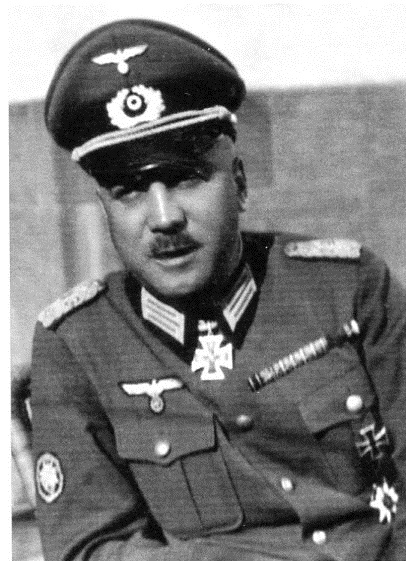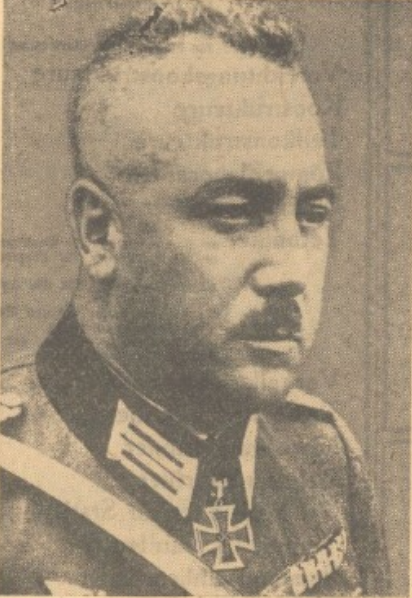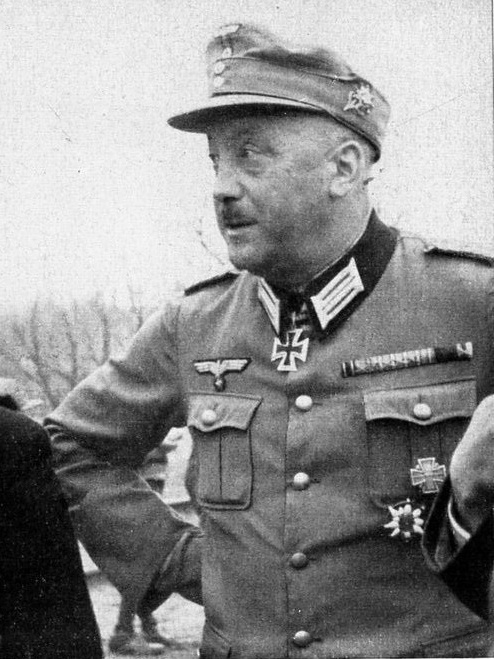More languages
More actions
August Sorko | |
|---|---|
 | |
| Nickname(s) | The Victor of Hellemobotn (Der Sieger von Helemoboten) |
| Born | 8 August 1891 Klagenfurt, Carinthia, Austria-Hungary |
| Died | 19 July 1941 (age 49) Komsomolske, Ukrainian SSR, Soviet Union |
| Allegiance | Austria Hungary (1912–1918) German-Austria (1918–1919) First Austrian Republic (1919–1934) Federal State of Austria (1934–1938) Nazi Germany (1938–1945) |
| Service/ | Imperial-Royal Landwehr (1912–1918) Volkswehr (1919) Bundesheer (1920–1938) Wehrmacht (1938–1941) |
| Years of service | 1912–1941 |
| Rank | Oberstleutnant |
| Unit | Alpine Jäger Regiment No. 11 137th Mountain Jäger Regiment |
| Commands held | 2nd "Sorko" Battalion, 137th Mountain Jäger Regiment |
| Battles/wars | |
| Awards | Carinthian Cross Imperial Order of the Iron Crown Iron Cross (2) Knight's Cross of the Iron Cross Silver Medal for Bravery |
Franz August Sorko (8 August 1891 – 19 July 1941) was an Austrian soldier and composer who served in both World Wars. He participated in the German invasions of Poland (1939), Norway (1940), Yugoslavia (1941), and the Soviet Union (1941) as the commander of the 2nd Battalion (nicknamed the "Sorko Group" or the "Sorko Battalion" after him) of the 137th Mountain Jäger Regiment.[1] Sorko died on the Eastern Front on 19 July 1941, almost a month into Operation Barbarossa.[2] Afterwards his death was used by the Nazis for propaganda purposes.[3]
Life[edit | edit source]
Franz August Sorko was born on 8 August 1891 in Klagenfurt, Austria-Hungary. He was the son of a merchant.[3]
Sorko joined the Austrian Landwehr on 10 October 1912 at the age of 21, being assigned to the 4th Landwehr Infantry Regiment, later renamed the Mountain Rifle Regiment No. 1. During World War I, he fought in Galicia and later on the Italian front, where he was injured by a shot to the lung. In 1915 he was promoted to Leutnant and in 1916 Oberleutnant. He won several awards for bravery and leadership during the war, including the Silver Medal for Bravery (1st class) and the Order of the Iron Crown (3rd class with war decoration and swords).[3][4]
After the war, Sorko participated in the Austro-Slovene conflict in Carinthia on the side of the Austrian government, leading his men to victory in Ferlach, Sankt Margareten im Rosental, and Eisenkappel. For this he was awarded the Carinthian Cross for Bravery. In 1921 he was promoted to Hauptmann and later he was promoted to Major. After the German occupation of Austria in 1938, Sorko joined the Wehrmacht, commanding the 2nd Battalion of the newly-formed 137th Mountain Jäger Regiment. That same year, Sorko, now an Oberstleutnant, took part in the German occupation of the Sudetenland.[3]
During the Polish Campaign, Sorko fought at the Battle of Lwów, where he distinguished himself, earning the Iron Cross, 1st and 2nd class. Sorko proved himself once again during the Norwegian campaign, for which he was awarded the Knight's Cross of the Iron Cross. In 1941 he was promoted to Oberst. He participated in the Axis invasion of Yugoslavia, invading the country from Bulgaria.[3] He was later promoted to Oberstleutnant.
Sorko took part in Operation Barbarossa. He died in Komsomolske in Ukraine on 19 July 1941. A street in Spittal an der Drau was named August-Sorko-Straße in his honour.[5]
Gallery[edit | edit source]
-
Photo of Sorko published in the Völkischer Beobachter
-
References[edit | edit source]
- ↑ https://www.lexikon-der-wehrmacht.de/Gliederungen/Gebirgsjagerregimenter/GJR137-R.htm
- ↑ "Gau Kärnten" (1941-08-01). Völkischer Beobachter. Archived from the original on 2023-02-01. Retrieved 2023-02-01.
- ↑ 3.0 3.1 3.2 3.3 3.4 "August Sorko, der Sieger von Helemoboten" (1941-07-30). Völkischer Beobachter. Archived from the original on 2024-04-07. Retrieved 2024-04-07.
- ↑ "Kriegsauszeichnung" (1918-02-27). Kärntner Tagblatt.
- ↑ "August Sorko in Spittal an der Drau" (1941-12-09). Völkischer Beobachter. Retrieved 2024-09-22.


